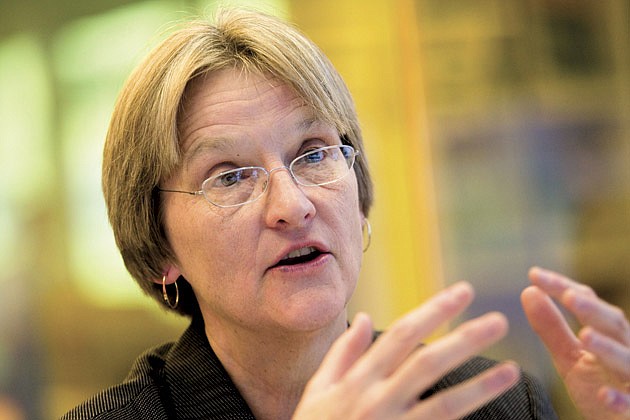Harvard's Faust plots a course for a 'unified' school to deal with the financial crisis.
Harvard University President Drew Faust is pushing to knock down traditional budgeting barriers among the school's independent divisions, after the school lost $11 billion of endowment value last fiscal year.
Harvard's 70 libraries, for example, must work together to increase savings, she said in a speech on campus in Cambridge, Mass. Schools and divisions across Harvard have to work together to cut the impact of the fund's losses resulting from the global financial crisis, she says.
Harvard's decentralized financial and administrative structure, often called “every tub on its own bottom,” gives each of its units, including the business, medical and law schools, an independent budget and administration. The power held by individual divisions sometimes interferes with cost savings in purchasing and other matters, Faust says.
“Local decision making is important for certain things we need,” she said in her speech. “But when each of us has the discretion to decide which of 30 different shades of crimson to put on our business cards, we've carried things a bit too far.”
Harvard presidents have been calling for a “more collaborative, more integrated” university since the time of Charles William Eliot, who stepped down 100 years ago, Faust says. In his 2007 annual report, former Harvard president
Derek Bok pointed out simple ways in which the school's decentralized spending led to costs.
Pads, pencils
“Hundreds of people throughout the university are authorized to buy pads, pencils, and other office supplies,” he wrote. “As a result, the university regularly loses the savings available through bulk purchasing and more systematic scanning of suppliers to obtain the best quality at the lowest possible price.”
Faust says fundraising at the school was down about 10% from the earlier fiscal year. Income from tuition and fees after the school's contribution to financial aid also fell, she says. Outside funding for research rose 7%, she says.
She didn't specify the dollar figure for fundraising and the amount income tuition and fees fell.
The value of Harvard's endowment, the world biggest academic fund, fell to about $26 billion as of June 30, the school said on Sept. 10. The endowment was valued at $37 billion a year earlier.
Harvard has already slowed campus construction, reduced the hiring of new faculty, frozen salaries and fired workers to address endowment losses. The fund contributed more than a third of Harvard's overall budget in the last fiscal year that ended June 30, she says. Harvard hasn't yet released a budget figure for the 2009- 2010 year.
Cutting the budget in proportion to the endowment loss would have meant spending about $500 million less in the current fiscal year, she says. Instead, the school will cut spending more slowly to soften the impact of the endowment's decline.
Harvard's library system, which has more than 16 million volumes, is the oldest in the U.S. and the largest academic library system in the world, according to the school's Web site. While the system is one of the school's “proudest treasures,” it's in need of better coordination, Faust says.
“Curious practices have grown up as the system has grown — obstacles to sharing and coordination,” she says. Economic arrangements at the libraries discourage them from working together, she says.
“Change in our library system is not a choice, but a necessity,” she says. “We need to ensure that we make that change in the wisest way possible.”
Schools can also see savings in their purchases of computers and other forms of information technology, she says.
“We must dedicate ourselves — individually and collectively — to harnessing the power of a more unified Harvard,” she says.
Harvard is also working to build education and research programs that span across divisional barriers, Faust says. The General Education program allows undergraduate students to more easily take courses from professors in the schools of law and business, for example, she says.
Harvard must be reshaped for its financial future, Faust says.
“At a time when higher education faces new financial constraints, our work here has never mattered more,” she says.






